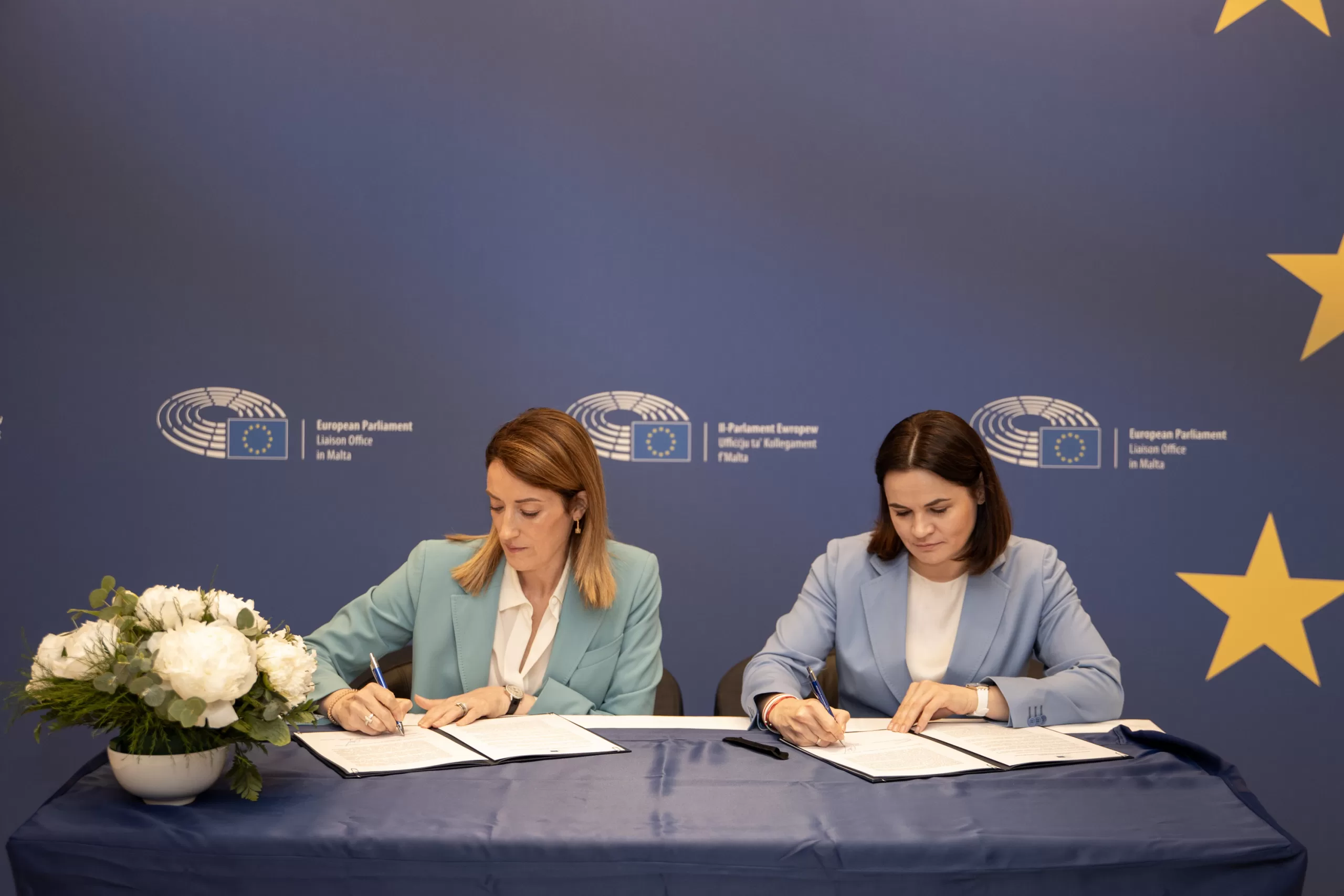The European Parliament and the Belarusian Democratic Forces (the Parties),
determined to enhance relations between the European Parliament and the democratic forces and civil society of Belarus, pursuant to the European Parliament resolution of 13 September 2023 on relations with Belarus[1],
condemning the unprecedented repression and the systemic and widespread human rights violations conducted by the Lukashenka regime, which may amount to crimes against humanity, and standing in solidarity with the people, democratic movement and civil society of Belarus in their struggle for a free, sovereign and democratic Belarus,
recognising the courageous fight of the Belarusian people to establish democracy, preserve independence and defend national identity in light of the Lukashenka regime’s dangerous undermining of the sovereignty of Belarus by turning it into a satellite state of Russia,
warmly acknowledging and supporting the public declarations made by the leader of the Belarusian democratic movement, Sviatlana Tsikhanouskaya, by the Coordination Council, by the United Transitional Cabinet of Belarus and by Belarusian political parties about the European aspirations of Belarusians,
welcoming the opening of the Mission of Democratic Belarus in Brussels and the establishment of the United Transitional Cabinet of Belarus, which, together with the Coordination Council, should be treated by the international community as the representatives of the people of Belarus,
hereby agree on the following common objectives and directions of cooperation:
- The European Parliament shall endeavour to continue monitoring the internal situation in Belarus, in particular human rights violations, the situation of political prisoners and other people persecuted on politically motivated grounds, of journalists, of human rights defenders, of trade union activists, of minorities and of non-governmental organisations, the regime’s attempts to legitimise itself, including through sham elections, the regime’s involvement in Russia’s unjustified war of aggression and war crimes against Ukraine, the threats posed by the Lukashenka regime to the EU and the measures taken by the regime to undermine the rights and freedoms of Belarusians abroad. To this end, the Parties shall conduct regular dialogue with the aim of developing the conditions for democratic transition in Belarus.
- The Parties shall each endeavour to continue to offer recommendations to the EU institutions and Member States on measures to increase pressure on the regime and support the efforts of the Belarusian democratic movement to thwart the threats to Belarus’s sovereignty, independence, national culture and language emanating from the deliberate actions of the Russian Federation and the rampant political, economic, military and cultural subordination of Belarus. The Parties shall endeavour to support the alleviation of migration challenges for those Belarusians who have been forced to flee Belarus for political reasons.
- The Parties shall endeavour to continue demanding the accountability, under existing international mechanisms, of the regime’s representatives and of the individuals responsible for grave human rights violations and crimes against humanity in Belarus and for complicity in war crimes and the crime of aggression against Ukraine.
- The Parties shall endeavour to encourage additional measures by the EU institutions and Member States to provide adequate help to Belarusian democratic forces and civil society activists, human rights defenders, independent media, and trade unions in order to bring democratic change in Belarus. This help shall be provided through, inter alia, the EU4Belarus programme and through capacity-building, training and mentoring initiatives and educational opportunities.
- The European Parliament’s Democracy Support and Election Coordination Group shall endeavour to continue offering tailored support to Belarusian democratic forces and civil society, using its actions and programmes. It shall help to enhance the capacity and technical expertise of the Coordination Council and of the United Transitional Cabinet with a view to fostering a democratic transition in the country and upholding Belarus’s independence and sovereignty. It shall also assist with strategic communication, offer support to human rights defenders and independent journalists and continue efforts to secure the release of political prisoners in Belarus.
- This agreement is without prejudice to the European Parliament’s continuing cooperation with all elements of the democratic forces of Belarus.
Done in Brussels, on May 3, in English and Belarusian, with both texts being equally authentic.
[1] OJ C, C/2024/1761, 22.3.2024, ELI: http://data.europa.eu/eli/C/2024/1761/oj.








